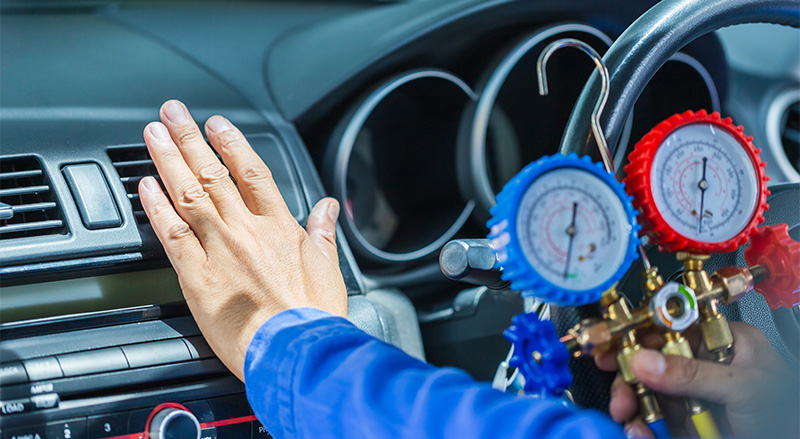Does Air Conditioning Use Gas in Cars?

When you switch on the air conditioning (AC) in your car during a hot summer day, you may wonder if it’s impacting your fuel efficiency. Many drivers have this question: “Does air conditioning use gas in cars?” The short answer is yes, running your car’s AC does use gas, but the extent of its impact depends on various factors. Let’s dive deeper into how AC systems work and their relationship with fuel consumption.
How Does a Car’s Air Conditioning Work?
To understand how AC uses gas, it’s important to know how the system operates:
- Compressor Functionality
- The AC system relies on a compressor, which is powered by the car’s engine. When you turn on the AC, the compressor compresses refrigerant gas, allowing it to cool the air before it is blown into the cabin.
- Energy from the Engine
- Since the compressor is driven by the engine, it draws power from the fuel being burned. This results in additional fuel consumption.
- Accessory Belt Connection
- The compressor is connected to the engine via an accessory belt, ensuring the AC can only run while the engine is operational.
Does Air Conditioning Use Gas in All Cars?
The answer depends on the type of vehicle you drive:
1. Gasoline and Diesel Cars
- In conventional cars powered by gasoline or diesel, the AC system uses energy directly from the engine, which increases fuel consumption when running.
2. Hybrid Cars
- Hybrid vehicles use a combination of a gasoline engine and an electric motor. In most hybrids, the AC is powered by the electric motor, which reduces the impact on fuel consumption.
3. Electric Cars
- Fully electric vehicles don’t use gas at all. However, running the AC in an electric car reduces the battery’s range, as it draws power from the battery pack.
How Much Gas Does the AC Use?
The exact amount of fuel used by the AC system varies based on several factors:
- Engine Size and Efficiency
- Larger engines may consume more fuel when the AC is on because they require more power to drive the compressor.
- AC Usage Duration
- Prolonged use of the AC leads to greater fuel consumption.
- Driving Conditions
- Using the AC in stop-and-go traffic has a greater impact on fuel efficiency compared to highway driving.
- Vehicle Make and Model
- Modern cars are designed to be more fuel-efficient, meaning their AC systems are optimized to use less gas.
Tips to Minimize Fuel Consumption While Using AC
While you may need to use the AC for comfort, there are ways to reduce its impact on fuel efficiency:
- Use AC Sparingly
- Avoid running the AC at full blast for extended periods.
- Pre-Cool Your Car
- Park in the shade or use a sunshade to reduce the interior temperature, minimizing the effort required by the AC.
- Switch to Recirculation Mode
- This mode cools the air inside the car instead of continuously pulling in hot air from outside.
- Maintain the AC System
- Regular maintenance ensures the AC runs efficiently, reducing fuel usage.
- Combine AC Use with Open Windows
- Open the windows to let out hot air before turning on the AC to ease the cooling process.
FAQs
1. Does turning off the AC improve fuel economy?
- Yes, turning off the AC reduces the load on the engine, which can improve fuel efficiency.
2. Is using the AC better than driving with windows down?
- At high speeds, it’s more fuel-efficient to use the AC than to drive with windows down, as open windows increase aerodynamic drag.
3. Do newer cars consume less gas with AC?
- Yes, modern vehicles are designed with more efficient compressors and systems that minimize the impact on fuel consumption.
4. Can I save fuel by setting the AC to a higher temperature?
- Yes, setting the temperature closer to the outside temperature reduces the effort required by the system, saving fuel.
5. Does running the AC while idling consume more gas?
- Yes, using the AC while idling increases fuel consumption because the engine must work harder to power the compressor.
Conclusion
Yes, air conditioning does use gas in cars, particularly in traditional gasoline and diesel vehicles. The AC system relies on the engine for power, which increases fuel consumption. However, the extent of this impact depends on factors like your car’s make and model, driving conditions, and how efficiently you use the AC. By following fuel-saving tips and being mindful of your AC usage, you can stay comfortable while minimizing its effect on your fuel economy.
Also Check:
• Does Running Your AC Use More Gas?






One Comment